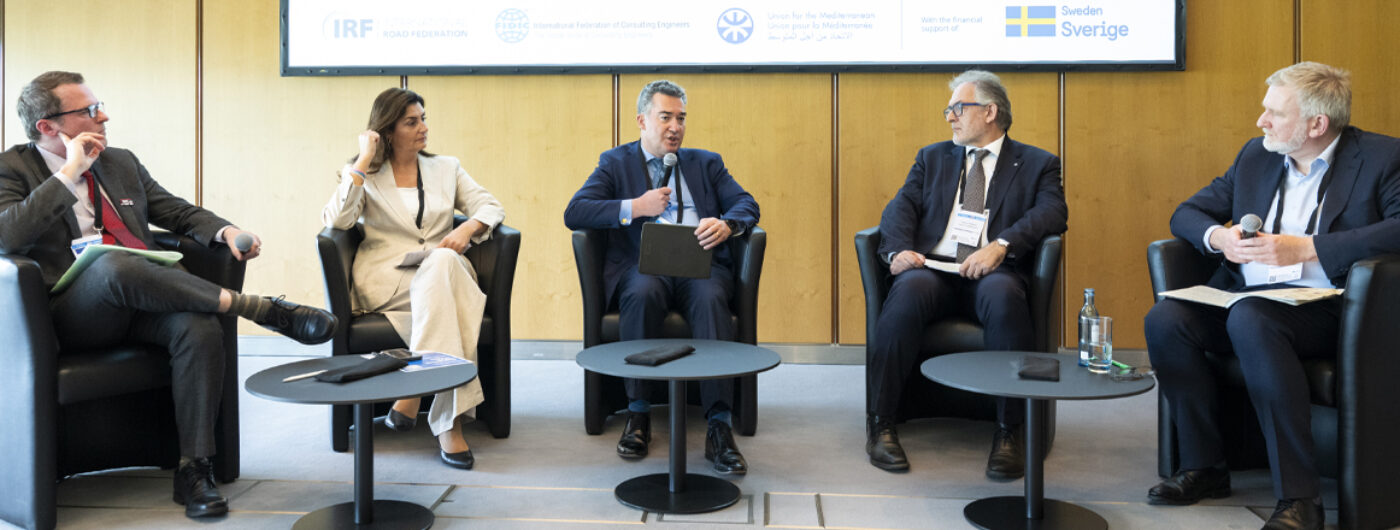
Gender-Responsive procurement boosts resilience of transport networks at ITF 2025 Summit
21 May 2025, Leipzig, Germany – The Union for the Mediterranean (UfM), in collaboration with the International Road Federation (IRF) and the International Federation of Consulting Engineers (FIDIC), and with the financial support of Sweden (Sida), organised the Official Side Event titled “Effective Qualifications-Based and Gender-Responsive Procurement as a Tool to Enhance the Resilience of Transport Systems” on 21 May 2025 during the ITF 2025 Summit held in Leipzig, Germany.
Transport systems in many LMICs remain under development, making the current decade crucial for avoiding inefficient investments and costly retrofitting in the future. Natural hazards cause an estimated USD 15 billion in direct damage to global transport systems annually, with LMICs bearing about USD 8 billion — the highest costs relative to their GDP. Despite the transport sector receiving around 29% of global climate finance, it faces the largest investment gap of any sector.
Against this background, the session explored the challenges and innovative procurement strategies and solutions for building resilient transport systems in low- and middle-income countries (LMICs) and emerging economies. It underscored the crucial role of effective procurement in shaping the resilience of transport infrastructure in the face of diverse global challenges, while optimising resources, promoting gender equality, and a more equitable and sustainable future.
The session featured key speakers, including Dhouha Najjar, UfM Acting Deputy Secretary General for Transport and Urban Development, and Gonzalo Alcaraz, IRF Acting Director General. The panel discussion brought together experts from across the field, including Francesc Carbonell, UfM Head of Sector for Transport, Susanna Zammataro, CEO of FIDIC, Nicolas Peltier, Global Director for Transport at the World Bank, and Reinaldo Fioravanti, Group Head of Infrastructure & Transportation at the Inter-American Development Bank (IDB). The session was moderated by Mike Evans, Director of Global Roads and Streets at ARUP and Board Member of IRF.
As highlighted by UfM Acting Deputy Secretary General Najjar during her Opening Address, “the Mediterranean region, at the crossroads of three continents, faces critical challenges. By focusing on resilience, climate adaptation, and social inclusion of transport systems, we can turn these challenges into opportunities for sustainable development. The next decade is crucial for building transport infrastructure that can withstand future shocks, particularly in vulnerable low- and middle-income countries. It is important to recognise the central role of the procurement process in shaping resilient transport infrastructure, while addressing broader social and environmental goals.”
As noted by Francesc Carbonell, UfM Head of Sector for Transport during the panel discussion, “public procurement is a significant policy instrument, accounting for 29% of government expenditures and approximately 12% of gross domestic product (GDP) in the OECD area. Public procurement policies and processes can therefore be a powerful tool to pursue strategic objectives and drive demand for greater gender equality. Even if infrastructure projects do not explicitly consider a gender angle, public procurement can help mainstream gender equality and gender considerations throughout the delivery and execution of transport infrastructure projects.”
The discussion touched upon qualifications-based procurement which prioritizes high-quality materials, experienced contractors, sustainable practices, and risk management. By adopting such methods, transport authorities were able to ensure that infrastructure projects were not only structurally resilient but also contributed to a diverse, inclusive workforce. This approach, it was argued, would lead to better long-term outcomes in terms of both project success and societal resilience.
Building on the ongoing partnership between the UfM Secretariat and the IRF, the event emphasized a shared commitment to inclusive, sustainable transport systems. The side event also complemented the broader goals of the ITF 2025 Summit, which brought together transport ministers, international organizations, and industry leaders to discuss global strategies for adapting to and recovering from disruptions.

